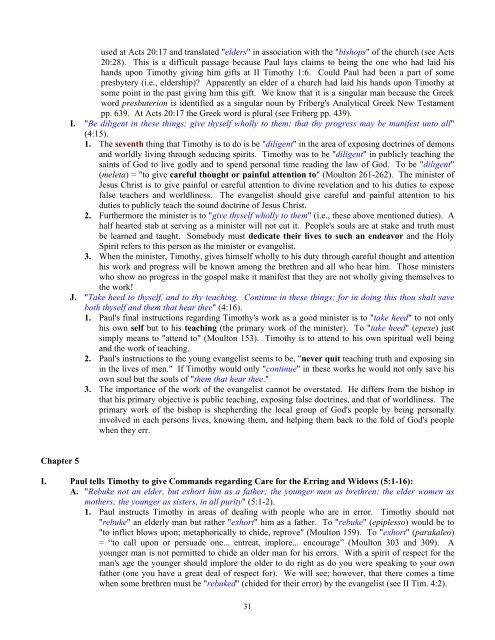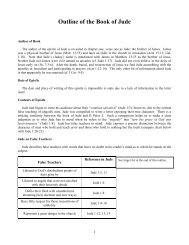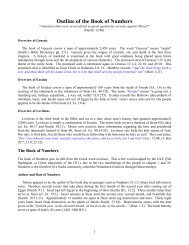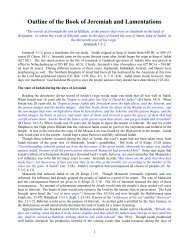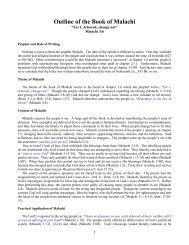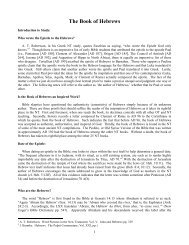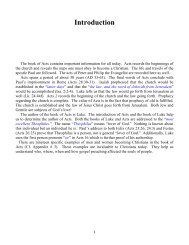Outline of the Book of I Timothy - The Floral Heights Church of Christ
Outline of the Book of I Timothy - The Floral Heights Church of Christ
Outline of the Book of I Timothy - The Floral Heights Church of Christ
You also want an ePaper? Increase the reach of your titles
YUMPU automatically turns print PDFs into web optimized ePapers that Google loves.
Chapter 5<br />
used at Acts 20:17 and translated "elders" in association with <strong>the</strong> "bishops" <strong>of</strong> <strong>the</strong> church (see Acts<br />
20:28). This is a difficult passage because Paul lays claims to being <strong>the</strong> one who had laid his<br />
hands upon <strong>Timothy</strong> giving him gifts at II <strong>Timothy</strong> 1:6. Could Paul had been a part <strong>of</strong> some<br />
presbytery (i.e., eldership)? Apparently an elder <strong>of</strong> a church had laid his hands upon <strong>Timothy</strong> at<br />
some point in <strong>the</strong> past giving him this gift. We know that it is a singular man because <strong>the</strong> Greek<br />
word presbuterion is identified as a singular noun by Friberg's Analytical Greek New Testament<br />
pp. 639. At Acts 20:17 <strong>the</strong> Greek word is plural (see Friberg pp. 439).<br />
I. "Be diligent in <strong>the</strong>se things; give thyself wholly to <strong>the</strong>m; that thy progress may be manifest unto all"<br />
(4:15).<br />
1. <strong>The</strong> seventh thing that <strong>Timothy</strong> is to do is be "diligent" in <strong>the</strong> area <strong>of</strong> exposing doctrines <strong>of</strong> demons<br />
and worldly living through seducing spirits. <strong>Timothy</strong> was to be "diligent" in publicly teaching <strong>the</strong><br />
saints <strong>of</strong> God to live godly and to spend personal time reading <strong>the</strong> law <strong>of</strong> God. To be "diligent"<br />
(meleta) = "to give careful thought or painful attention to" (Moulton 261-262). <strong>The</strong> minister <strong>of</strong><br />
Jesus <strong>Christ</strong> is to give painful or careful attention to divine revelation and to his duties to expose<br />
false teachers and worldliness. <strong>The</strong> evangelist should give careful and painful attention to his<br />
duties to publicly teach <strong>the</strong> sound doctrine <strong>of</strong> Jesus <strong>Christ</strong>.<br />
2. Fur<strong>the</strong>rmore <strong>the</strong> minister is to "give thyself wholly to <strong>the</strong>m" (i.e., <strong>the</strong>se above mentioned duties). A<br />
half hearted stab at serving as a minister will not cut it. People's souls are at stake and truth must<br />
be learned and taught. Somebody must dedicate <strong>the</strong>ir lives to such an endeavor and <strong>the</strong> Holy<br />
Spirit refers to this person as <strong>the</strong> minister or evangelist.<br />
3. When <strong>the</strong> minister, <strong>Timothy</strong>, gives himself wholly to his duty through careful thought and attention<br />
his work and progress will be known among <strong>the</strong> brethren and all who hear him. Those ministers<br />
who show no progress in <strong>the</strong> gospel make it manifest that <strong>the</strong>y are not wholly giving <strong>the</strong>mselves to<br />
<strong>the</strong> work!<br />
J. "Take heed to thyself, and to thy teaching. Continue in <strong>the</strong>se things; for in doing this thou shalt save<br />
both thyself and <strong>the</strong>m that hear <strong>the</strong>e" (4:16).<br />
1. Paul's final instructions regarding <strong>Timothy</strong>'s work as a good minister is to "take heed" to not only<br />
his own self but to his teaching (<strong>the</strong> primary work <strong>of</strong> <strong>the</strong> minister). To "take heed" (epexe) just<br />
simply means to "attend to" (Moulton 153). <strong>Timothy</strong> is to attend to his own spiritual well being<br />
and <strong>the</strong> work <strong>of</strong> teaching.<br />
2. Paul's instructions to <strong>the</strong> young evangelist seems to be, "never quit teaching truth and exposing sin<br />
in <strong>the</strong> lives <strong>of</strong> men." If <strong>Timothy</strong> would only "continue" in <strong>the</strong>se works he would not only save his<br />
own soul but <strong>the</strong> souls <strong>of</strong> "<strong>the</strong>m that hear <strong>the</strong>e."<br />
3. <strong>The</strong> importance <strong>of</strong> <strong>the</strong> work <strong>of</strong> <strong>the</strong> evangelist cannot be overstated. He differs from <strong>the</strong> bishop in<br />
that his primary objective is public teaching, exposing false doctrines, and that <strong>of</strong> worldliness. <strong>The</strong><br />
primary work <strong>of</strong> <strong>the</strong> bishop is shepherding <strong>the</strong> local group <strong>of</strong> God's people by being personally<br />
involved in each persons lives, knowing <strong>the</strong>m, and helping <strong>the</strong>m back to <strong>the</strong> fold <strong>of</strong> God's people<br />
when <strong>the</strong>y err.<br />
I. Paul tells <strong>Timothy</strong> to give Commands regarding Care for <strong>the</strong> Erring and Widows (5:1-16):<br />
A. "Rebuke not an elder, but exhort him as a fa<strong>the</strong>r; <strong>the</strong> younger men as brethren: <strong>the</strong> elder women as<br />
mo<strong>the</strong>rs; <strong>the</strong> younger as sisters, in all purity" (5:1-2).<br />
1. Paul instructs <strong>Timothy</strong> in areas <strong>of</strong> dealing with people who are in error. <strong>Timothy</strong> should not<br />
"rebuke" an elderly man but ra<strong>the</strong>r "exhort" him as a fa<strong>the</strong>r. To "rebuke" (epiplesso) would be to<br />
"to inflict blows upon; metaphorically to chide, reprove" (Moulton 159). To "exhort" (parakaleo)<br />
= “to call upon or persuade one... entreat, implore... encourage” (Moulton 303 and 309). A<br />
younger man is not permitted to chide an older man for his errors. With a spirit <strong>of</strong> respect for <strong>the</strong><br />
man's age <strong>the</strong> younger should implore <strong>the</strong> older to do right as do you were speaking to your own<br />
fa<strong>the</strong>r (one you have a great deal <strong>of</strong> respect for). We will see; however, that <strong>the</strong>re comes a time<br />
when some brethren must be "rebuked" (chided for <strong>the</strong>ir error) by <strong>the</strong> evangelist (see II Tim. 4:2).<br />
31


